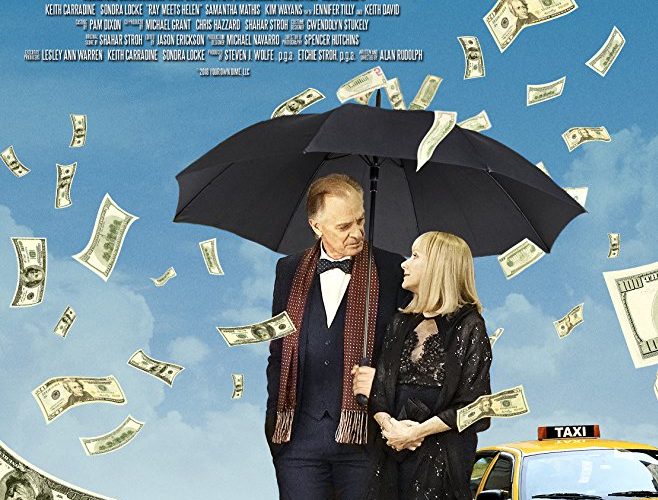Even in his prime, Alan Rudolph always seemed lost in time, nostalgic for an unlived past. His flawed characters reflect this alienation to modernity, fatalistically drawn towards each other in expressionistically empty cities populated only by other luckless, lonely ensemble members. He is a genuine romantic, working against a mainstream Hollywood that seems historically unkind to romantics — see also the similarly neglected career trajectories of other scrappy, romantic classicists such as Hal Hartley or Whit Stillman — held in high regard by those with the pleasure of having stumbled upon him but criminally unrecognized otherwise. In a vast filmography of 22 feature films shot over 30 years, this isolation has never resounded more autobiographically than in Ray Meets Helen, his long-awaited return to filmmaking after some 16 years of inactivity.
The production is significant all-around. Ray Meets Helen marks Rudolph’s sixth collaboration with Keith Carradine, as well as Sondra Locke’s first role in almost two decades. These ellipses, paired with a grand reunion between director and muse, is significant subtext, leaving a separation of production details from the art difficult but ultimately unnecessary. What is already a charming film becomes further imbued with poignancy by autobiographical throughlines that drastically improve one’s viewing experience. In its narrative, two desperate, elderly strangers with nothing left to live for who meet in a whirlwind of circumstances after coincidentally running into a large sum of money, and what was once the agitator of their depraved lifestyles is now a catalyst for reinvention. Just as Rudolph was limited by his finances, spending a career scrounging up funds for future projects, Ray and Helen find their potential squandered, then rewarded.

This theme of reinvention, of embodying one’s fantasies, manifests well. It is a film of old dogs learning new tricks. Carradine and Locke give sympathetic performances as the two title characters, who both adopt wealthy personas but remain informed by their past struggle. Rudolph himself, whose visual experimentation was also somewhat shaped in the past by budget restraint, continues this trend into the uncharted west of a digital 21st century. His vision of Los Angeles, which emphasizes the unpleasantries of the city — the arid heat, the superficiality — is jarring at first, with a slickness that contrasts the gritty film aesthetic utilized prior. It remains genuinely evocative, however, still scarcely populated and embodying overwhelming loneliness. But he doesn’t make depressing films, and this initial aesthetic is uplifted by constant playful banter and punctuated by moments of euphoric transgression, expressionistically conveyed with flurries of superimposition and sound.
Rudolph remains an ample wordsmith, positioning the disconnect between his dialogue and the characters into a dreamy affect. The estrangement between characters themselves is also conveyed in such a paradoxical manner; it occasionally seems as if they are speaking in soliloquies, but listen carefully, for he laces his dialogue skillfully with double-entendres that permit his characters to intuitively have two conversations at once. Each line flows well with the other’s response, then once more with their own. At the precise moment of watching Ray Meets Helen, this acuity with language lends itself to the film’s subtle lyricism. However, despite this light disposition, this is not an underwhelming film, and the feelings linger prominently.
The emotional climax, a duet of “Beautiful Dreamers,” becomes a repeated musical motif. It is an apt ballad: published posthumously, crafted a few days prior to songwriter Stephen Foster’s death. The lyrics are hopelessly romantic, even naive, and may be directed to the memory of somebody long passed, but one need not listen carefully to feel the impact of its emotions. This effortless, unassuming empathy characterizes the film as a whole: delicate, immensely strange, but filled with a singular Rudolphian magic.
Ray Meets Helen is now in theatrical release.

